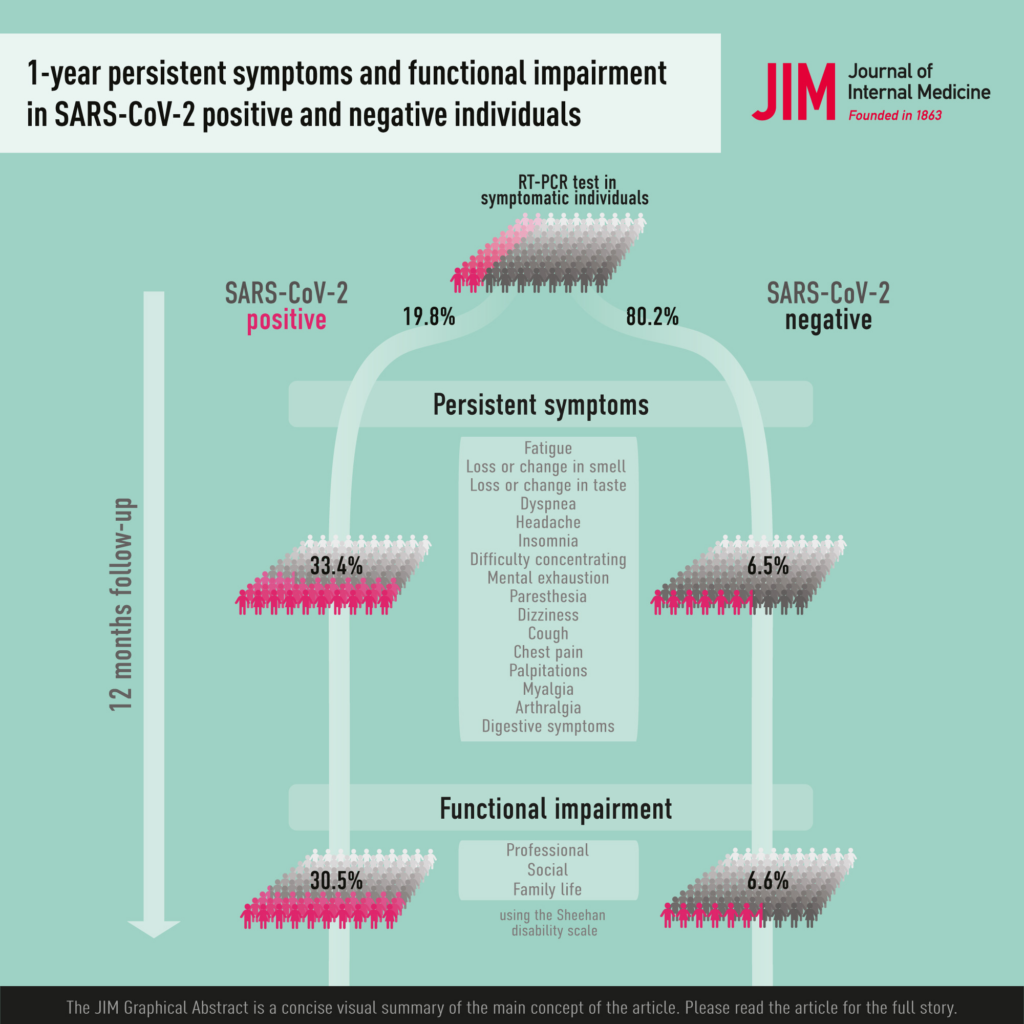Journal of Internal Medicine, 15 März 22
https://onlinelibrary.wiley.com/doi/epdf/10.1111/joim.13482
Abstract
Background
Persistent symptoms of SARS-CoV-2 are prevalent weeks to months following the infection. To date, it is difficult to disentangle the direct from the indirect effects of SARS-CoV-2, including lockdown, social, and economic factors.
Objective
The study aims to characterize the prevalence of symptoms, functional capacity, and quality of life at 12 months in outpatient symptomatic individuals tested positive for SARS-CoV-2 compared to individuals tested negative.
Methods
From 23 April to 27 July 2021, outpatient symptomatic individuals tested for SARS-CoV-2 at the Geneva University Hospitals were followed up 12 months after their test date.
Results
At 12 months, out of the 1447 participants (mean age 45.2 years, 61.2% women), 33.4% reported residual mild to moderate symptoms following SARS-CoV-2 infection compared to 6.5% in the control group. Symptoms included fatigue (16% vs. 3.1%), dyspnea (8.9% vs. 1.1%), headache (9.8% vs. 1.7%), insomnia (8.9% vs. 2.7%), and difficulty concentrating (7.4% vs. 2.5%). When compared to the control group, 30.5% of SARS-CoV-2 positive individuals reported functional impairment at 12 months versus 6.6%. SARS-CoV-2 infection was associated with the persistence of symptoms (adjusted odds ratio [aOR] 4.1; 2.60–6.83) and functional impairment (aOR 3.54; 2.16–5.80) overall, and in subgroups of women, men, individuals younger than 40 years, those between 40–59 years, and in individuals with no past medical or psychiatric history.
Conclusion
SARS-CoV-2 infection leads to persistent symptoms over several months, including in young healthy individuals, in addition to the pandemic effects, and potentially more than other common respiratory infections. Symptoms impact functional capacity up to 12 months post infection.

Susanne: In dieser Schweizer Studie werden die Auswirkungen der Pandemie auf die Gesundheit, aber vor allem die zum großen Teil die mit einer SARS-CoV2-Infektion assoziierten persistierenden Symptome näher betrachtet. Dabei ergaben sich Prozentsätze um 30%, die nach 12 Monaten noch milde bis moderate Symptome berichteten versus 6,5 % in der Kontrollgruppe. Es wird gezeigt, dass die Pandemie selbst Auswirkungen auf die Gesundheit (“Kollateralschäden“) hat – ein sehr großer Anteil der persistierenden Symptome ist aber direkt mit der SARS-CoV2-Infektion assoziiert. Die untersuchte Gruppe war eher zu Beginn der Pandemie erkrankt (03-07/20), also mit dem Wildvirus infiziert, und vor allem ungeimpft. Bei geimpften Personen ist das Risiko deutlich niedriger, wie inzwischen bekannt ist.
Fazit Regen:
Es sind Teilnehmer der ersten Coronawelle. Es werden keine Geimpften eingeschlossen. Trotz negativem Ausgangsbefund sind doch recht viele (6%) nach einem Jahr auch ohne Corona eingeschränkt.
Betroffen sind unserer Erfahrung nach sehr sportliche Menschen und Menschen, die vorher eine psychosomatische Genese hatten.